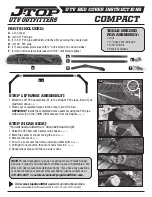
The Occupant Restraint Controller (ORC) monitors the internal circuits and interconnecting wiring
associated with electrical Air Bag System Components listed below:
Air Bag System Components
•
Occupant Restraint Controller (ORC)
•
Air Bag Warning Light
•
Steering Wheel and Column
•
Instrument Panel
•
Knee Impact Bolsters
•
Driver and Front Passenger Air Bags
•
Supplemental Side Air Bags
•
Supplemental Knee Air Bags
•
Front and Side Impact Sensors
•
Seat Belt Pretensioners
•
Seat Track Position Sensors
•
Seat Belt Buckle Switch
If A Deployment Occurs
The front air bags are designed to deflate immediately after deployment.
NOTE:
Front and/or side air bags will not deploy in all collisions. This does not mean something is wrong
with the air bag system.
If you do have a collision which deploys the air bags, any or all of the following may occur:
•
The air bag material may sometimes cause abrasions and/or skin reddening to the occupants
as the air bags deploy and unfold. The abrasions are similar to friction rope burns or those you
might get sliding along a carpet or gymnasium floor. They are not caused by contact with
chemicals. They are not permanent and normally heal quickly. However, if you haven’t healed
significantly within a few days, or if you have any blistering, see your doctor immediately.
•
As the air bags deflate, you may see some smoke-like particles. The particles are a normal
by-product of the process that generates the non-toxic gas used for air bag inflation. These
airborne particles may irritate the skin, eyes, nose, or throat. If you have skin or eye irritation,
rinse the area with cool water. For nose or throat irritation, move to fresh air. If the irritation
continues, see your doctor. If these particles settle on your clothing, follow the garment
manufacturer’s instructions for cleaning.
Do not drive your vehicle after the air bags have deployed. If you are involved in another collision,
the air bags will not be in place to protect you.
G E T T I N G S T A R T E D
26
















































